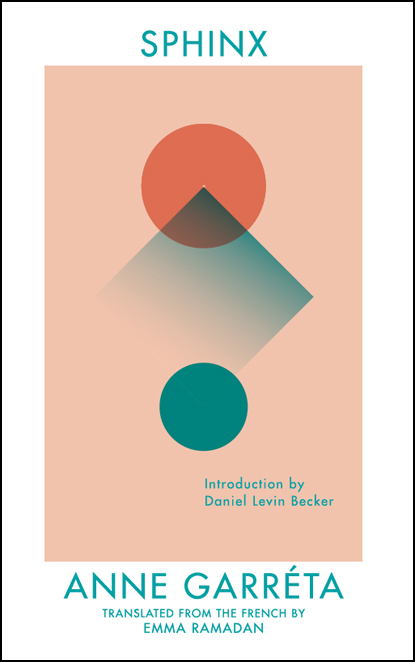Sphinx
Authors: Anne Garréta



The first genderless novel ever written, Anne Garréta's
Sphinx
is a landmark linguistic and literary accomplishment that combines the philosophical intricacies of Monique Wittig and Roland Barthes with the ornate language of Alan Hollinghurst. Garréta's debut novel at twenty-three years old,
Sphinx
was published in France in 1986 to universal acclaim and gained the author admittance into the prestigious Oulipo literary collective in 2000.
Sphinx
is a modern classic of experimental, feminist, and queer literature, translated into five languages but never before published in English. This publication marks the first full-length work by a female member of the Oulipo to ever be published in English.

More praise for
Sphinx
:
“...a bold, strange, perfectly constructed novel.” â
EVA DOMENEGHINI
“A literary featâ¦The most beautiful praise one can give to a novel is to say that it is unlike anything elseâ¦What she has done is a kind of masterpiece.” â
JACQUES LAURENT
“Astonishing.” â
SYLVIE GENEVOIX
,
Madame Figaro
“One wonders whether Anne Garréta, who thinks of everything, thought of the nightmare she was setting up for her translatorsâinto English, for example, where the possessive,
his, her,
agrees with the subject?” â
MICHELLE BERNSTEIN
,
Chronique
“A remarkable entrance into the literary scene⦠A first novel so promising that it foreshadows, one hopes, a long literary career.” â
JOYSANE SAVIGNEAU
,
Le Monde
“Anne Garréta has achieved what is certainly the most difficult and rarest feat in a first novel-memoire: she disconcerts the reader.” â
ANDRÃ BRINCOURT
,
Le Figaro



Deep Vellum Publishing
2919 Commerce St. #159, Dallas, Texas 75226
deepvellum.org
· @deepvellum
Copyright © 2015 by Anne Garréta
Originally published in French as
Sphinx
by Editions Grasset & Fasquelle in Paris, 1986
English translation copyright © 2015 by Emma Ramadan
First edition, 2015
All rights reserved.
ISBN: 978-1-941920-08-4 (ebook)
LIBRARY OF CONGRESS CONTROL NUMBER: 2015930301
â
Cet ouvrage, publié dans le cadre d'un programme d'aide à la publication, bénéficie du soutien du Ministère des Affaires étrangères et du Service Culturel de l'Ambassade de France aux Etats-Unis.
This work, published as part of a program of aid for publication, received support from the French Ministry of Foreign Affairs and the Cultural Services of the French Embassy in the United States.
â
Cover design & typesetting by Anna Zylicz ·
annazylicz.com
Text set in Bembo, a typeface modeled on typefaces cut by Francesco Griffo for Aldo Manuzio's printing of
De Aetna
in 1495 in Venice.
Deep Vellum titles are published under the fiscal sponsorship of The Writer's Garret, a nationally recognized nonprofit literary arts organization.
Distributed by Consortium Book Sales & Distribution.
To the third
CONTENTS

An anecdote that may be instructive to the reader of novels written under Oulipian constraint: in 1969, after Georges Perec published
La Disparition
âif not the most illustrative example of an Oulipian novel then certainly the easiest to explain
1
âa critic named René-Marill Albérès reviewed it, lukewarmly, in the journal
Les Nouvelles littéraires.
Other critics reviewed
La Disparition
too, of course; what stood out about Albérès was that he plainly missed the central conceit of the book, namely that it had been written without any words containing the letter E.
I bring this up because, whatever grim conclusions we may reach specific to Albérès's deftness as a reader (and
La Disparition
takes place in a world from which the letter E has gone mysteriously missing, so it's not like there weren't clues), his gaffe points out a pitfall with the potential to trip up even the most meticulous littérateur: reading an Oulipian novel without knowing the precise way in which it is Oulipian.
Did I say pitfall? I might have meant windfall.
As types of vertigo go, after all, being in the Oulipian dark is not such a bad one. It can even be refreshing, given that most novels in this milieu are preceded at some distance by their reputations. But in any
case let's continue to treat the situation with gravity, so to speak, for a moment longer.
The first time I read
Sphinx,
Anne Garréta's first novel, I knew that it was Oulipian,
2
but not how. It took me about forty pages to figure out its conceit, and what I felt once I did was more than just relief, more than just satisfaction to have quieted that nagging sense of missing something: I was, well, still bewildered. But it was a refreshing, trees-to-forest kind of bewilderment, the kind that comes when, say, you've been so busy trying to put together a jigsaw puzzle that you're caught off guard by how strange and fascinating the resulting picture is. A bewilderment that asks not
what
but how. Like its namesake from Greek myth,
Sphinx
was that rare riddle that only makes you think harder after you know the answer.
Now, I assume that if you're here you already know the answer, such as it is: you know the unspoken constraint behind the novel you are about to read, or have maybe just finished. (If you happen
not
to know the answer yet, I urge you to do everything in your power to stay ignorant for a while longer: sheathe the front and back covers of the book in kraft paper, avoid discussing it with booksellers, and don't read any reviews unless you're confident that they were written by lousy, inattentive critics. One hint: Anne Garréta uses the letter E plenty of times hereinâyour quarry lies elsewhere.)
Here's the thing about
Sphinx,
though: it will bewilder you no matter which side of the riddle you enter from. The reader who knows what he or she is getting into from the outset loses nothing of the novel's
true vertigoâthe high-wire act by which Garréta, under the cover of a relatively conventional narrative, quietly dismantles various conventions in the way we think and speak about love and despair and need. It bewilders me still, less on the technical level than on the level at which the technical merges with the conceptual, the medium with the message. To read
Sphinx
already aware of its conceit is only to break the picture back into its constituent puzzle pieces, to reverse the sequence of the questions your bewilderment asks: to go in wondering how the novelist pulled off this one trick,
3
but come out wondering what kind of reality you've been inhabiting.
